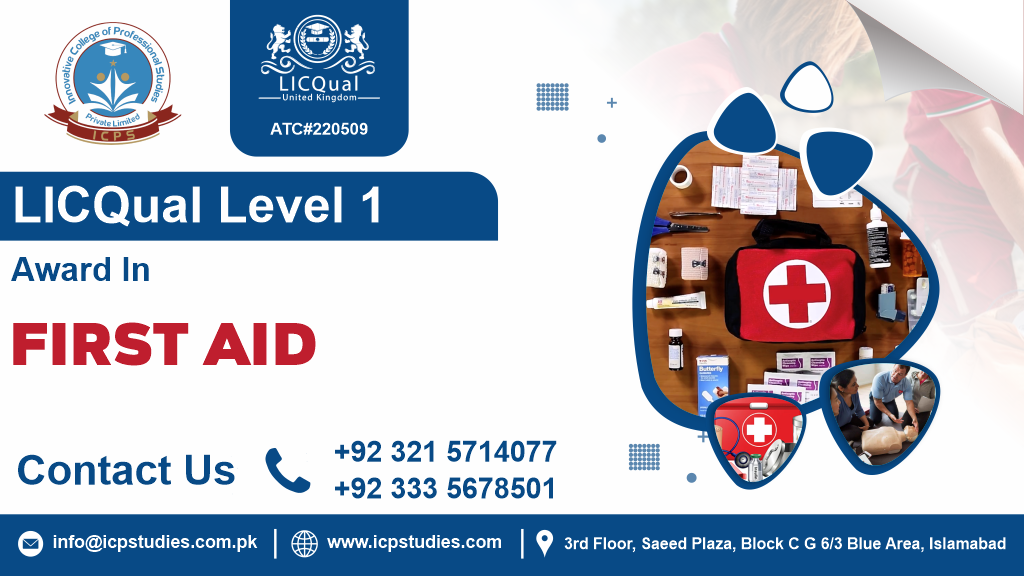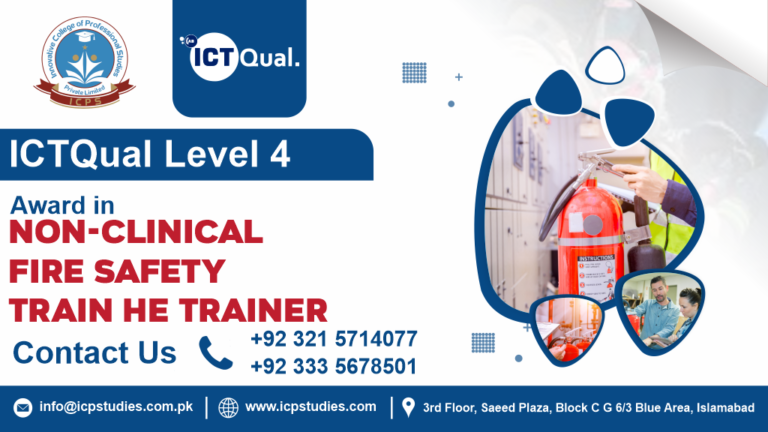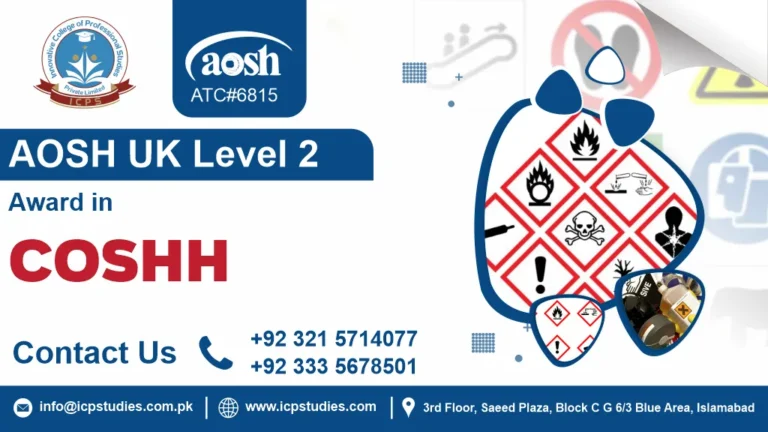Our comprehensive program provides a solid foundation in first aid principles and practices, covering essential topics such as assessing the scene of an emergency, CPR, bandaging techniques, and responding to common medical emergencies. You’ll gain the confidence and skills needed to provide immediate assistance in a wide range of emergency situations.
Whether you’re at home, at work, or out in the community, having first aid skills can make a critical difference in saving lives. With the LICQual Level 1 Award, you’ll be prepared to respond effectively to emergencies such as choking, heart attacks, strokes, allergic reactions, and injuries until professional help arrives.
First aid skills are valuable not only in personal life but also in professional settings. Employers highly value employees who are trained in first aid, as they contribute to a safer workplace and demonstrate a commitment to health and safety. By obtaining the LICQual Level 1 Award, you’ll enhance your employability and career prospects across various industries.
As a certified first aider, you’ll have the power to positively impact your community by providing immediate assistance to those in need. Whether it’s a family member, colleague, or stranger, your ability to administer first aid can make a profound difference in someone’s life during a medical emergency.
Don’t wait for an emergency to strike before taking action.. Enroll now in theLICQual Level 1 Award in First Aid today and equip yourself with the skills to save lives and make a difference in your community.
All About Level 1 Award in First Aid
Course Overview
The LICQual Level 1 Award in First Aid is a foundational training program designed to provide individuals with essential knowledge and skills in basic first aid. Developed by industry experts, this comprehensive course equips participants with the confidence and ability to respond effectively to medical emergencies in various settings, including home, workplace, and community environments.
Participants learn fundamental first aid principles, including the primary aims of first aid, the importance of the emergency services, and the role of the first aider. They also acquire practical skills such as assessing the scene of an emergency, prioritizing care, and maintaining personal safety.
CPR is a critical skill that can help save lives during cardiac arrest. Participants are trained in CPR techniques for adults, children, and infants, including chest compressions, rescue breaths, and the use of automated external defibrillators (AEDs) when available.
The course covers the recognition and initial management of common medical emergencies, such as heart attacks, strokes, seizures, choking, allergic reactions, and diabetic emergencies. Participants learn how to assess the signs and symptoms of these conditions and provide appropriate first aid interventions.
Proper wound care and bandaging techniques are essential for preventing infection and promoting healing. Participants learn how to assess and clean wounds, apply dressings, control bleeding, and immobilize injured body parts using bandages and slings.
Upon successful completion of the LICQual Level 1 Award in First Aid course, participants typically receive a recognized certification, demonstrating their competency in basic first aid skills. This certification can be valuable for personal development, career advancement, and meeting regulatory requirements in certain industries. Overall, the course empowers individuals to be confident and capable first aiders, ready to respond to medical emergencies and make a positive difference in their communities.
Study Units
Learning Outcomes
Here are the outcomes associated with each of the study units:
. Introduction to First Aid:
- Understand the importance of first aid and its role in providing immediate assistance during emergencies.
- Recognize the legal and ethical responsibilities of a first aider, including the duty to act and duty of care.
- Identify common first aid equipment and resources, and know how to access emergency medical services when needed.
2. Assessing the Scene:
- Learn systematic approaches to assess the scene of an emergency safely and effectively.
- Identify potential hazards and ensure personal safety before providing assistance to casualties.
- Gather relevant information and assess the severity of injuries or medical conditions to prioritize care appropriately.
3. Cardiopulmonary Resuscitation (CPR):
- Demonstrate proficiency in performing cardiopulmonary resuscitation (CPR) on adults, children, and infants.
- Understand the steps involved in CPR, including chest compressions, rescue breaths, and the use of automated external defibrillators (AEDs).
- Recognize the signs of cardiac arrest and respond promptly with appropriate CPR techniques to maximize the chances of survival.
4. Managing Bleeding and Wounds:
- Learn how to assess and control different types of bleeding, including arterial, venous, and capillary bleeding.
- Apply appropriate techniques to manage wounds, such as cleaning, dressing, and bandaging, to prevent infection and promote healing.
- Recognize signs of infection or complications and know when to seek further medical assistance for wound care.
5. Common Medical Emergencies:
- Identify common medical emergencies, such as heart attacks, strokes, seizures, diabetic emergencies, and allergic reactions.
- Understand the signs and symptoms of each medical condition and provide appropriate first aid interventions to stabilize the casualty.
- Know when to activate emergency medical services and provide ongoing care until professional help arrives.
6. Choking and Airway Obstruction:
- Recognize the signs of choking and airway obstruction in adults, children, and infants.
- Demonstrate proficiency in performing abdominal thrusts (Heimlich maneuver) and back blows to dislodge foreign objects from the airway.
- Provide reassurance and support to choking casualties while taking prompt action to clear the airway and restore normal breathing.
7. Emergency Communication and Reporting:
- Understand the importance of effective communication during emergencies, including clear and concise instructions to bystanders and emergency services.
- Know how to initiate and maintain communication with emergency medical dispatchers, providing accurate information about the situation and casualty condition.
- Learn the protocols for documenting and reporting first aid incidents, including maintaining confidentiality and privacy of casualties’ information.
By mastering these study units and achieving the associated outcomes, participants will be equipped with the knowledge and skills necessary to respond confidently and effectively to a wide range of medical emergencies. This comprehensive training in first aid empowers individuals to make a positive difference in their communities by providing immediate assistance and potentially saving lives.
Admission Criteria
Here are the typical entry requirements for the course:
- Minimum Age Requirement: Participants must meet the minimum age requirement set by the training provider, which is often 16 years or older. This ensures that participants have the maturity and capacity to understand and apply first aid principles effectively.
- Language Proficiency: Since the course materials, instructions, and assessments are typically conducted in the primary language of instruction (usually English), participants should have a sufficient level of proficiency in the language to understand and engage with the content effectively.
- Physical Fitness: While there are no specific fitness tests for entry into the course, participants should be in reasonably good health and physical condition to engage in practical activities, such as CPR simulations, bandaging techniques, and casualty assessments. Individuals with mobility issues or health conditions that may impact their ability to participate should inform the training provider in advance to ensure appropriate accommodations can be made.
- Educational Background: There are typically no formal educational prerequisites for enrolling in the Level 1 First Aid course. However, participants should have a basic level of literacy and numeracy skills to understand written instructions, complete assessments, and communicate effectively during training sessions.
- Commitment to Learning: Participants should demonstrate a genuine interest in learning first aid principles and techniques and be committed to actively participating in the course. This includes attending all scheduled training sessions, engaging in practical exercises and simulations, and completing assessments to the best of their ability.
- Legal Considerations: Some training providers may require participants to sign waivers or indemnity forms acknowledging the risks associated with practical first aid training and confirming their consent to participate in hands-on activities.
Overall, the entry requirements for the LICQual Level 1 Award in First Aid course are designed to ensure that participants have the necessary prerequisites to engage effectively with the training and develop essential first aid skills to respond confidently and competently to medical emergencies.
Ideal Candidate
This course is ideal for:
- Parents and Caregivers: Parents, guardians, and caregivers who are responsible for the well-being of children and family members can benefit greatly from this course. Learning first aid skills equips them to respond confidently to common childhood emergencies such as cuts, burns, choking, and falls.
- Teachers and Childcare Providers: Educators, childcare providers, and youth leaders who work with children in schools, daycare centers, or recreational settings can enhance the safety of their students by becoming trained in first aid. They learn how to assess and respond to medical emergencies that may occur in the classroom or during outdoor activities.
- Workplace Employees: Employees in various industries can benefit from first aid training to create safer work environments and respond to on-the-job injuries or medical incidents. From office settings to construction sites, first aid skills are valuable for mitigating risks and providing immediate assistance until professional help arrives.
- Students and Volunteers: Students, volunteers, and community members who want to make a positive impact in their communities can gain valuable skills through this course. Whether participating in volunteer activities, sports events, or community projects, first aid training prepares them to assist others in need.
- Health and Fitness Professionals: Health and fitness professionals, including personal trainers, gym instructors, and sports coaches, can enhance their services by offering first aid support to clients during workouts or sporting activities. Being trained in first aid allows them to respond promptly to injuries or medical emergencies that may occur during exercise sessions.
- Individuals Pursuing Healthcare Careers: Individuals considering careers in healthcare, such as nursing, medicine, or emergency medical services (EMS), can benefit from obtaining foundational first aid skills as a stepping stone to more advanced medical training. First aid training provides a solid introduction to basic medical concepts and patient care principles.
- Community Leaders and Volunteers: Community leaders, volunteers, and members of civic organizations play a vital role in ensuring the safety and well-being of their communities. First aid training equips them to respond effectively to medical emergencies during community events, disaster relief efforts, or public gatherings.
Overall, the LICQual Level 1 Award in First Aid course is designed for anyone who wants to be prepared to respond confidently and competently to medical emergencies in various settings. Whether for personal enrichment, professional development, or community service, first aid training empowers individuals to make a positive difference and potentially save lives.
FAQs about Level 1 Award in First Aid







